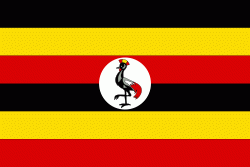Ganda language
The Ganda language or Luganda (, Oluganda, ) is a Bantu language spoken in the African Great Lakes region. It is one of the major languages in Uganda and is spoken by more than 10 million Baganda and other people principally in central Uganda including the capital Kampala of Uganda. Typologically, it is an agglutinative, tonal language with subject–verb–object word order and nominative–accusative morphosyntactic alignment.
With at least more than 16 million first-language speakers in the Buganda region and 5 million others fluent elsewhere in different regions especially in major urban areas like Mbale, Tororo, Jinja, Gulu, Mbarara, Hoima, Kasese etc. Luganda is Uganda's defacto language of national identity as it's the most widely spoken Ugandan language used mostly in trade in urban areas, the language is also the most unofficial spoken language in Rwanda's capital Kigali. As a second language, it follows English and precedes Swahili in Uganda.
Luganda is used in some primary schools in Buganda as pupils begin to learn English, the primary official language of Uganda. Until the 1960s, Luganda was also the official language of Uganda till now instruction in primary schools in Eastern Uganda.
A notable feature of Luganda phonology is its geminate consonants and distinctions between long and short vowels. Speakers generally consider consonantal gemination and vowel lengthening to be two manifestations of the same effect, which they call simply "doubling" or "stressing".
Luganda is also a tonal language; the change in the pitch of a syllable can change the meaning of a word. For example, the word kabaka means 'king' if all three syllables are given the same pitch. If the first syllable is high then the meaning changes to 'the little one catches' (third person singular present tense Class VI ka- of -baka 'to catch'). This feature makes Luganda a difficult language for speakers of non-tonal languages to learn. A non-native speaker has to learn the variations of pitch by prolonged listening.
Unlike some other Bantu languages, there is no tendency in Luganda for penultimate vowels to become long; in fact they are very frequently short, as in the city name Kampala Kámpalâ, pronounced, in which the second vowel is short in Luganda.
With at least more than 16 million first-language speakers in the Buganda region and 5 million others fluent elsewhere in different regions especially in major urban areas like Mbale, Tororo, Jinja, Gulu, Mbarara, Hoima, Kasese etc. Luganda is Uganda's defacto language of national identity as it's the most widely spoken Ugandan language used mostly in trade in urban areas, the language is also the most unofficial spoken language in Rwanda's capital Kigali. As a second language, it follows English and precedes Swahili in Uganda.
Luganda is used in some primary schools in Buganda as pupils begin to learn English, the primary official language of Uganda. Until the 1960s, Luganda was also the official language of Uganda till now instruction in primary schools in Eastern Uganda.
A notable feature of Luganda phonology is its geminate consonants and distinctions between long and short vowels. Speakers generally consider consonantal gemination and vowel lengthening to be two manifestations of the same effect, which they call simply "doubling" or "stressing".
Luganda is also a tonal language; the change in the pitch of a syllable can change the meaning of a word. For example, the word kabaka means 'king' if all three syllables are given the same pitch. If the first syllable is high then the meaning changes to 'the little one catches' (third person singular present tense Class VI ka- of -baka 'to catch'). This feature makes Luganda a difficult language for speakers of non-tonal languages to learn. A non-native speaker has to learn the variations of pitch by prolonged listening.
Unlike some other Bantu languages, there is no tendency in Luganda for penultimate vowels to become long; in fact they are very frequently short, as in the city name Kampala Kámpalâ, pronounced, in which the second vowel is short in Luganda.
Country
-
Uganda
Uganda (Yuganda in Ugandan languages), officially the Republic of Uganda (Jamhuri ya Uganda ), is a landlocked country in East Africa. The country is bordered to the east by Kenya, to the north by South Sudan, to the west by the Democratic Republic of the Congo, to the south-west by Rwanda, and to the south by Tanzania. The southern part of the country includes a substantial portion of Lake Victoria, shared with Kenya and Tanzania. Uganda is in the African Great Lakes region, lies within the Nile basin, and has a varied but a generally modified equatorial climate. It has a population of around 49.6 million, of which 8.5 million live in the capital and largest city of Kampala.
Uganda is named after the Buganda kingdom, which encompasses a large portion of the south of the country, including the capital Kampala and whose language Luganda is widely spoken throughout the country. From 1894, the area was ruled as a protectorate by the United Kingdom, which established administrative law across the territory. Uganda gained independence from the UK on 9 October 1962. The period since then has been marked by violent conflicts, including an eight-year-long military dictatorship led by Idi Amin.
